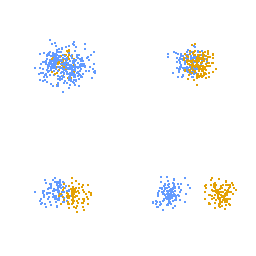A Way To Explore More Efficiently
This article describes an algorithm to explore the unknown more efficiently than brute force “trying them all”.
As you may already know, you can do things, and the things you do have outcomes.
In the diagram below, each square dot is a possible outcome of an action - let’s say, an experience, like “i remember that i have eaten breakfast today”. e.g. The blue dots are the set of likely outcomes from doing the blue action.

Top left: (the likely outcome of) blue covers orange; the system will not act orange, only blue.
Top right: (the likely outcome of) blue overlaps greatly with orange, so the system is said to be greatly confused about the two actions.
Bottom left: (the likely outcome of) blue overlaps slightly with orange, so the system is said to be slightly confused about the two actions.
Bottom right: the likely outcome of the two actions do not have overlap. the system can decide to do either action independently.
Being confused about blue and orange means that the system may find another action (the “up” action) whose outcome covers both blue and orange instead of doing blue or orange. The more confused it is, the more energy it will spend on searching for the “up” action.
If you are such an intelligent system, you must consider the following:
- What are my available actions?
- What are the potential outcomes of a certain action?
- How do I caculate the “overlap-ness” of different outcome sets.
- How to find an “up” action for a set of action.
And further more,
- What should I even do?
If you have time and energy, you can of course do all the actions available to you at the same time. If you have slightly less energy, you can do all the available non-confused actions. If you have less energy, then, pick an action at random and do it. If you have personality, then pick what you like to do. As I said in /c/, personality makes decision making not so random.
Q: What’s this algorithm called?
A: idk.
Q: The category?
A: To Explore.
Q: Is the size of a set of outcomes important in decision making?
A: No.
Q: Does this algorithm only apply to one’s futures?
A: No. This algorithm can apply to any mathematical thingy that contains the “action-outcome-overlap” structure. Like a search tree, for example.
Q: Wait I haven’t asked yet
A: This algorithm can be retrofitted to noveler4.